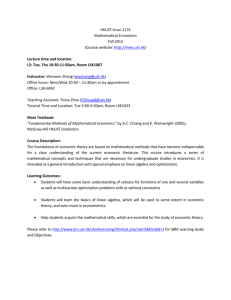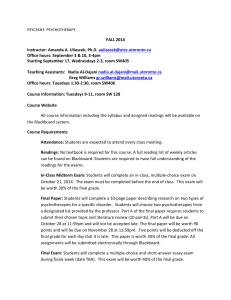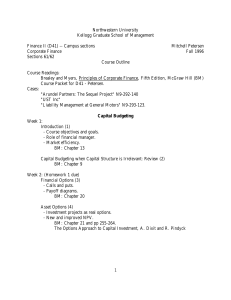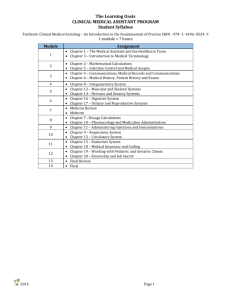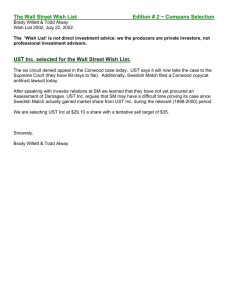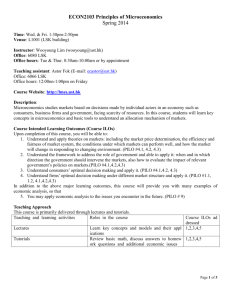Syllabus: Financial Management
advertisement
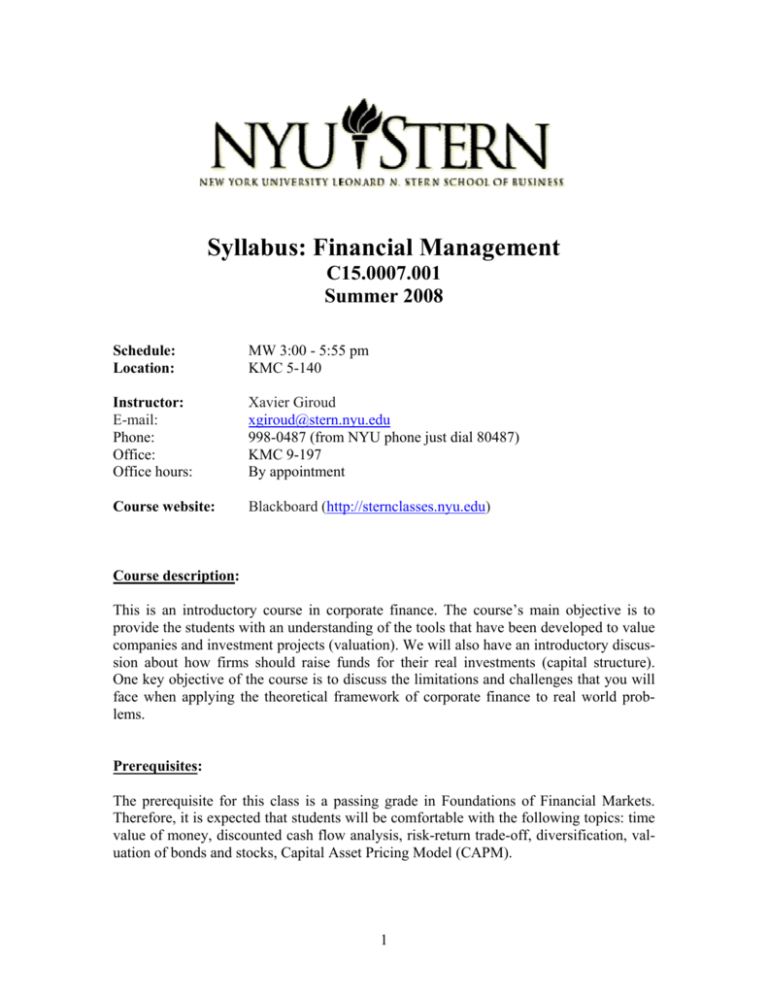
Syllabus: Financial Management C15.0007.001 Summer 2008 Schedule: Location: MW 3:00 - 5:55 pm KMC 5-140 Instructor: E-mail: Phone: Office: Office hours: Xavier Giroud xgiroud@stern.nyu.edu 998-0487 (from NYU phone just dial 80487) KMC 9-197 By appointment Course website: Blackboard (http://sternclasses.nyu.edu) Course description: This is an introductory course in corporate finance. The course’s main objective is to provide the students with an understanding of the tools that have been developed to value companies and investment projects (valuation). We will also have an introductory discussion about how firms should raise funds for their real investments (capital structure). One key objective of the course is to discuss the limitations and challenges that you will face when applying the theoretical framework of corporate finance to real world problems. Prerequisites: The prerequisite for this class is a passing grade in Foundations of Financial Markets. Therefore, it is expected that students will be comfortable with the following topics: time value of money, discounted cash flow analysis, risk-return trade-off, diversification, valuation of bonds and stocks, Capital Asset Pricing Model (CAPM). 1 Course Material: Lecture Notes (required): We will use lecture notes. The booklet with the lecture notes will be distributed in the first class on June 30. These lecture notes contain gaps which we will fill out together in class. Case Studies (required): You need to buy the case studies from the bookstore. The course package includes four Harvard Business School Case Studies: Arundel Partners, Super Project, UST, and Kennecott. • Super Project and UST are group projects. I will post some questions that you will have to answer. You may work in groups of up to 4 students, although you can work alone if you prefer. Each group must hand in a solution in class which will be graded on a pass/fail basis. Moreover, each group must prepare an in-class presentation. Each time I will randomly select two groups and have them present their solution. The due dates for the group projects are • Super Project: July 23rd UST: August 4th Arundel Partners and Kennecott will not be graded and you don’t need to hand in anything. Nevertheless, I expect all of you to read these cases carefully as we will go through them in class. Textbook (recommended): The lecture notes are self-contained. Thus, no textbook is required. For those of you who wish to use a textbook in addition to the class notes, I recommend that you use Brealey, R. A., Myers, S. C., and F. Allen, 2007, Principles of Corporate Finance, 9th edition, McGraw-Hill. The lecture notes are mostly based on this book. The relevant chapters are indicated in the course schedule. This textbook can be used as background reading for those of you who wish to read ahead of the lecture or dig deeper into the material. As far as the exams go all the relevant material is contained in the lecture notes. 2 Calculator: Please bring a calculator. There are no restrictions regarding the type of calculator you may use. Any calculator in which you can compute powers like xy will do the job. Midterm and Final: The dates for the midterm and final are: Midterm: July 21st Final: August 6th Both exams are open book: You can bring your lecture notes, cases, problem sets, and personal notes, as well as a calculator. No other material though. The midterm is 90 minutes and the final is 120 minutes. The final will be cumulative with more weight on the post-midterm material. Grading: Midterm: 40%, Final: 60%. You need a “pass” in both group projects (Super Project and UST). Each time you fail a group project I will deduct 5 points from your final score. (The maximum final score is 100.) Following departmental guidelines (sorry), the course will be graded on a curve with an approximate grade distribution of: 25-35% A’s, 50-70% B’s, 5-15% C’s and below. No incompletes will be given. Blackboard: Check blackboard at least once a week. All communication will take place via blackboard. This includes homework assignments (with solutions). I strongly advise you that you do these assignments on a regular basis. If you wait until the exam, it will be too late. 3 Course Schedule: Lecture Notes Book Chapters Annuities and Perpetuities LN1 2, 3 July 2 Rules for making Investment Decisions LN2 6 3 July 7 Real Options LN3 11.4 4 July 9 Cash Flows (Part I) Case: Arundel Partners LN4 7.1, 7.2 5 July 14 Cash Flows (Part II) LN4 7.1, 7.2 6 July 16 The Cost of Capital LN5 10 (skip 10.4) 7 July 21 Midterm Exam 8 July 23 Capital Structure (Part I) Case: Super Project LN6 18, 19 9 July 28 Capital Structure (Part II) LN6 18, 19 10 July 30 Interaction between Investment and Financing Decisions LN7 20 11 Aug-04 Case: UST Case: Kennecott 12 Aug-06 Final Exam Session Date Topic 1 June 30 2 The course schedule is subject to change (please follow the announcements in class). 4



